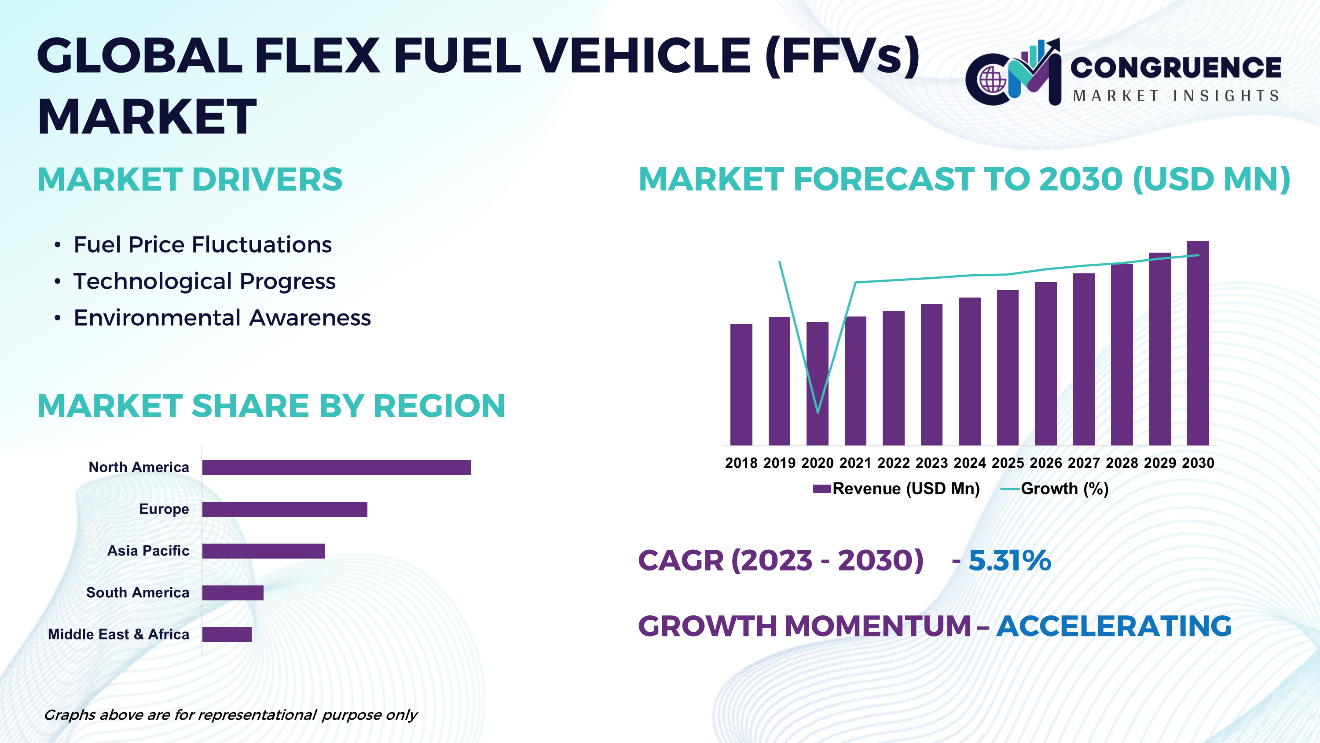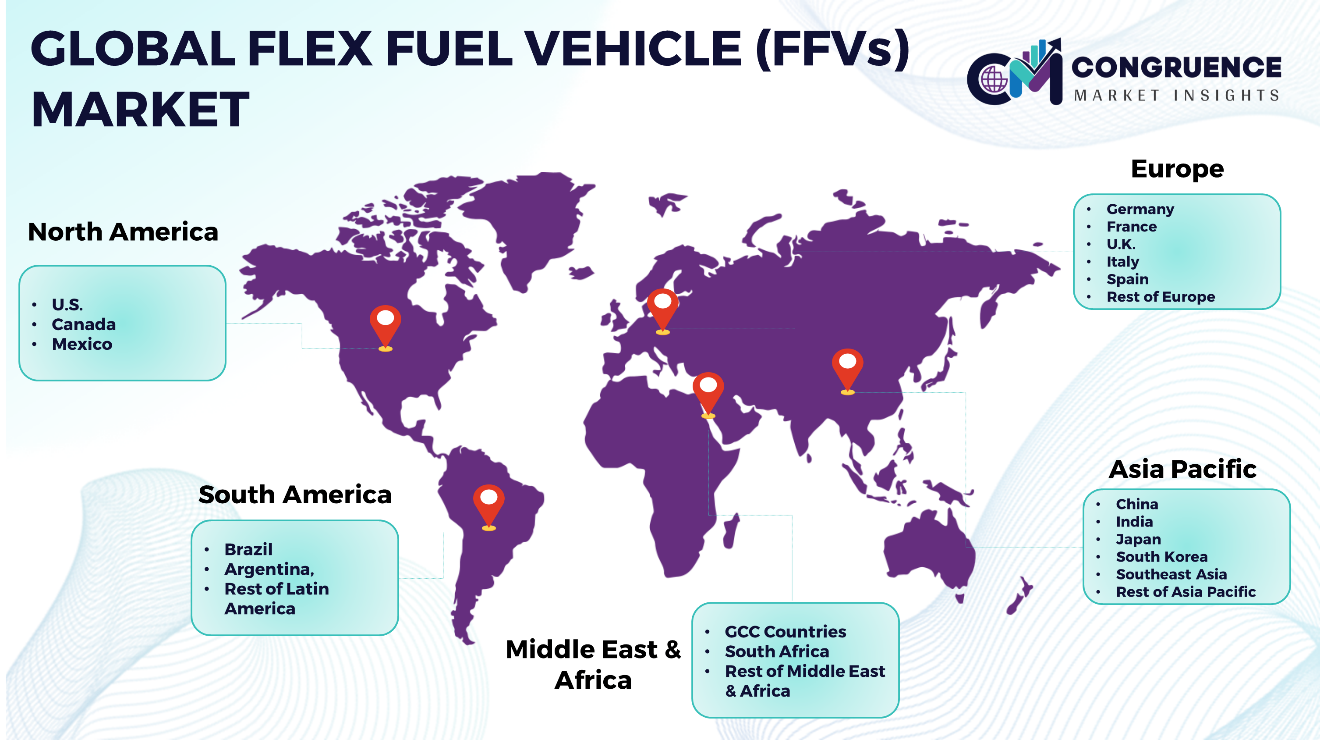Reports
The Global Flex Fuel Vehicles (FFVs) Market is expected to expand at a CAGR of 5.31% between 2023 and 2030. Flex Fuel Vehicles (FFVs) have been introduced to address environmental concerns and diversify fuel options in the automotive sector. These vehicles are designed to operate on a blend of gasoline and alternative fuels such as ethanol or methanol, providing consumers with increased fuel versatility and reducing reliance on traditional fossil fuels. Technological advancements in FFVs focus on enhancing engine performance and fuel efficiency while ensuring compatibility with various fuel blends. Advanced engine management systems and fuel delivery technologies enable FFVs to seamlessly transition between different fuel types, enhancing their practicality and consumer appeal. The market landscape for FFVs is shaped by government regulations promoting alternative fuel adoption, alongside collaborations between automakers and fuel providers to expand alternative fuel infrastructure and availability. With growing environmental awareness and stricter regulations, FFVs are poised to play a significant role in the future of sustainable transportation.

Flex Fuel Vehicles (FFVs) Market Major Driving Forces
Fuel Price Fluctuations: Volatility in gasoline prices and energy security worries drive the search for alternative fuel options. FFVs provide flexibility by enabling users to switch between gasoline and ethanol blends, potentially reducing costs and lessening dependence on imported oil.
Technological Progress: Continuous advancements in engine design and fuel delivery systems enhance FFV performance and efficiency. Improved engine management software ensures optimal fuel blending and combustion, maximizing power output while minimizing emissions.
Environmental Awareness: Increasing concerns about climate change prompt interest in alternative fuels. FFVs, capable of running on renewable options like ethanol, offer a cleaner transportation solution, appealing to environmentally conscious individuals and policymakers.
Flex Fuel Vehicles (FFVs) Market Key Opportunities
Infrastructure Development: Investments in alternative fuel infrastructure, such as ethanol production facilities and fueling stations, present opportunities to expand the availability and accessibility of ethanol-blended fuels, supporting FFV market growth.
Government Incentives: Continued government support through incentives such as tax credits, subsidies, and regulatory mandates for alternative fuel vehicles presents an opportunity for FFV adoption and market growth.
Consumer Preferences: Increasing consumer interest in environmentally friendly vehicles and fuel options presents an opportunity for automakers to meet market demand with a wider range of FFV models and configurations.
Flex Fuel Vehicles (FFVs) Market Key Trends
· Growing environmental consciousness among consumers leads to increased demand for FFVs, which offer reduced emissions and reliance on fossil fuels.
· Ongoing advancements in engine design and fuel delivery systems improve FFV performance, efficiency, and compatibility with a wider range of fuel blends.
· Investments in alternative fuel infrastructure, such as ethanol production facilities and fueling stations, expand the availability and accessibility of ethanol-blended fuels, supporting FFV market growth.
· Increasing consumer interest in environmentally friendly vehicles and fuel options drives automakers to offer a wider range of FFV models and configurations to meet market demand.
· FFV market expansion into emerging markets with growing automotive industries and increasing environmental regulations provides new opportunities for manufacturers and suppliers.

Market Competition Landscape
In the competitive landscape of the FFV market, suppliers vie for market share through product differentiation and innovation. Factors such as product quality, pricing, technological advancements, and distribution networks influence competitive dynamics. Additionally, regulatory compliance, sustainability initiatives, and consumer preferences for eco-friendly vehicles shape the competitive environment, driving suppliers to continually enhance their offerings and market positioning.
Key players in the global Flex Fuel Vehicles (FFVs) market implement various organic and inorganic strategies to strengthen and improve their market positioning. Prominent players in the market include:
· Honda Motor Co., Ltd.
· Toyota Motor Corporation
· Mitsubishi Motors Corporation
· Renault Group
· Ford Motor Company
· Citroën international
· FCA Group
· Kia Corporation
· Volvo
|
Report Attribute/Metric |
Details |
|
Base Year |
2022 |
|
Forecast Period |
2023 – 2030 |
|
Historical Data |
2018 to 2022 |
|
Forecast Unit |
Value (US$ Mn) |
|
Key Report Deliverable |
Revenue Forecast, Growth Trends, Market Dynamics, Segmental Overview, Regional and Country-wise Analysis, Competition Landscape |
|
Segments Covered |
· By Fuel Type (Ethanol-Based, Methanol-Based, and Other) · By Vehicle Type (Passenger Cars, Light Commercial Vehicles (LCVs), and Heavy Commercial Vehicles (HCVs)) · By Sales Channel (Original Equipment Manufacturers (OEMs), and Aftermarket) |
|
Geographies Covered |
North America: U.S., Canada and Mexico Europe: Germany, France, U.K., Italy, Spain, and Rest of Europe Asia Pacific: China, India, Japan, South Korea, Southeast Asia, and Rest of Asia Pacific South America: Brazil, Argentina, and Rest of Latin America Middle East & Africa: GCC Countries, South Africa, and Rest of Middle East & Africa |
|
Key Players Analyzed |
Honda Motor Co., Ltd., Toyota Motor Corporation, Mitsubishi Motors Corporation, Renault Group, Ford Motor Company, Citroën international, FCA Group, Kia Corporation, Volvo |
|
Customization & Pricing |
Available on Request (10% Customization is Free) |
